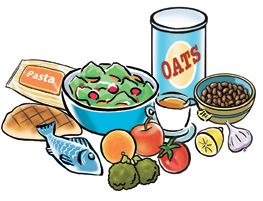This diet removes foods that are high in salt. It also limits the amount of salt you use when cooking. It is most often used for people with high blood pressure, fluid retention (edema), and kidney, liver, or heart disease.
Table salt has the mineral sodium. Your body needs sodium to work normally. But too much sodium can make your health problems worse. Your health care provider advises a low-salt (low-sodium) diet for you. Your total daily allowed amount of salt is 1,500 to 2,300 milligrams (mg). This is less than 1 teaspoon of table salt. This means you can have only about 500 to 700 mg of sodium at each meal. People with certain health problems should limit salt intake to the lower end of the advised range.
When you cook, don’t add much salt. If you can cook without using salt, even better. Don’t add salt to your food at the table. Use herbs and spices to flavor your food.
When shopping, read food labels. Salt is often called sodium on the label. Choose foods that are salt-free, low salt, or very low salt. Note that foods with reduced salt may not lower your salt intake enough.
Beans, legumes, and nuts
OK: Dry beans, split peas, lentils, canned beans with no added salt, and unsalted nuts.
Avoid: Regular (salt added) canned beans and salted nuts.
Breads and grains
OK: Low-sodium breads, rolls, cereals, cakes, low-salt crackers, matzo crackers, oats, rice, pasta with no salt added, and unsalted popcorn.
Avoid: Salted crackers, pretzels, tortilla chips, popcorn, and other salty snacks, as well as French toast, pancakes, muffins, regular bread, instant oatmeal packets, and prepackaged seasoned rice or pasta blends.
Dairy
OK: Milk, chocolate milk, hot chocolate mix, low-salt cheeses, and yogurt.
Avoid: Processed cheese and cheese spreads, Roquefort, Camembert, cottage cheese, buttermilk, and instant breakfast drinks.
Desserts
OK: Ice cream, frozen yogurt, juice bars, gelatin, sugar, honey, jelly, and hard candy (though be mindful of added sugars in these foods).
Avoid: Most pies, cakes, and cookies made with salt, and instant pudding.
Drinks
OK: Tea, coffee, fizzy (carbonated) drinks, and juices.
Avoid: Flavored coffees, electrolyte replacement drinks, and sports drinks.
Meats
OK: All fresh meat, fish, poultry, low-salt tuna, eggs, and egg substitute.
Avoid: Smoked, pickled, brine-cured, or salted meats and fish, and processed poultry injected with salt or marinade (this includes bacon, chipped beef, jerky, corned beef, hot dogs, deli meats, ham, kosher meats, salt pork, sausage, canned tuna, salted codfish, smoked salmon, herring, sardines, and anchovies).
Seasonings
OK: Most seasonings are OK. Good substitutes for salt include fresh herb blends, hot sauce, lemon, garlic, curry, vinegar, dry mustard, parsley, cilantro, horseradish, tomato paste, low-salt mayonnaise, unsalted butter and margarine, cream cheese, vegetable and olive oil, cream, low-salt salad dressing, and gravy.
Avoid: Regular ketchup, relishes, pickles, soy sauce, teriyaki sauce, Worcestershire sauce, BBQ sauce, tartar sauce, meat tenderizer, chili sauce, regular gravy, regular salad dressing, and salted butter.
Soups
OK: Low-salt soups and broths made with allowed foods.
Avoid: Bouillon cubes, soups with smoked or salted meats, and regular soup and broth.
Vegetables
OK: Most vegetables are OK, including canned vegetables with no salt added, plain frozen vegetables, and low-salt tomato and vegetable juices.
Avoid: Sauerkraut and other brined vegetables, pickles and pickled vegetables, tomato juice, olives, canned vegetables with salt, frozen vegetables with sauces, and salted potato chips.


